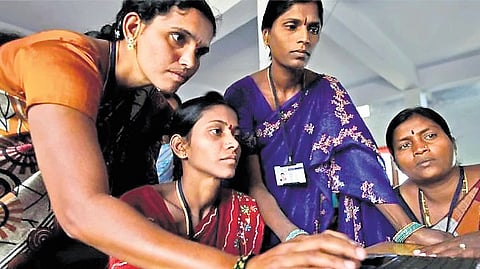

The Union Budget for 2024-25 has allocated more than Rs 3 lakh crore for schemes benefitting women and girls. If used properly, this allocation can be a game-changer for a country that has witnessed extremely low participation of women in the workforce. India ranks 129th in the World Economic Forum’s 2024 Global Gender Gap index among 146 countries.
The latest Periodic Labour Force Survey (PLFS) reported the participation rate of women in the workforce was at 35.9 percent in 2022-23, while that of men was 76 percent—a gap of over 40 percentage points. Though women’s participation has increased 13.9 percentage points from the PLFS round of 2017-18, it is mostly attributed to self-employment, at around 65 percent. Women’s concentration in self-employment, mostly informal, has remained a major concern from a policy perspective as it reflects low-quality work and challenges in accessing social security.
Employment generation and improving employability have remained the top priorities for the government. There have been various initiatives to promote women’s participation. The PLFS has shown women are mostly employed in services and manufacturing sectors. The latest budget aims to support working women through setting up hostels in collaboration with industry and establishing creches, a significant step for boosting women’s ability to work across sectors. Some other proposals to encourage women’s work participation include promotion of women-specific skilling programmes and market access for women’s self-help groups’ products. Such initiatives have the potential to promote entrepreneurship.
The special attention given to smaller enterprises and manufacturing, particularly labour-intensive manufacturing, is a consequential move as the manufacturing sector happens to be one of the largest employers of women. The budget includes a package that covers financing, regulatory changes and technology support for smaller enterprises for encouraging growth. Though manufacturing is one of the largest sectors in urban areas employing women, they are mostly employed in low-end processing work in apparel, textile and tobacco segments. Women-owned MSMEs constitute 20.5 percent of the total MSMEs registered on the Udyam Registration Portal since its inception on July 2020. The contribution of women-owned MSMEs to total turnover of Udyam-registered MSMEs is 10.22 percent.
However, there are pay gaps in MSMEs since women are mostly in informal arrangements. Lack of educational attainment, skills, adequate welfare, coupled with the burden of domestic care responsibilities push women towards these sectors.
To address these challenges, the government initiated several schemes in the past, including working women’s hostels known as Sakhi Niwas implemented by the Ministry of Women and Child Development. This centrally-sponsored scheme aims to promote availability of safe and conveniently located accommodation for working women with daycare facilities for their children in urban, semi-urban and rural areas. Presently, there are 494 centrally-sponsored functional working women’s hostels in the country with children’s daycare facilities. The scheme, launched in 1972-73, became a part of Mission Shakti during 2021-22 under the Samarthya sub-scheme. The budget allocation towards this scheme was `87.40 crore during FY 2024-25. As per government reports, some states like Bihar and West Bengal are yet to establish such hostels while some southern states like Kerala, Karnataka and Tamil Nadu have more of such hostels. These can be strengthened in states with the new budget allocation, in places where there are fewer or no hostels.
In January 2024, the Ministry of Labour and Employment released an advisory for employers that reflected the need to create working women’s hubs, where the local large and small enterprises can collaborate to build common facilities with attached creches and senior care facilities. The budgetary support for smaller enterprises can be used to create such hubs, making it possible for women to join the workforce.
The budget’s emphasis on skilling opens up a plethora of opportunities. An interesting aspect is its focus on skilling curriculums that have remained in academic and policy discourse for long. The Industrial Training Institutes (ITIs) have been questioned for promoting gender stereotypical trades like beautician and tailoring courses for women and driving, plumbing, electrical courses for men. As per the PLFS, 12.3 percent women and 26 percent men received vocational training in the 15-59 age group in 2021-22, with evident gender gaps.
A study titled ‘Gender study to identify constraints on female participation in skill training and labour market in India’ from the Ministry of Skill Development and Entrepreneurship reported that geographical location was a factor determining the choice of trades along with a reluctance to allow women in engineering-related trades. In collaboration with the International Labour Organization, neighbouring countries like Bangladesh have developed national strategies to promote female participation in technical and vocational education while creating linkages with industry demands.
A report from the NITI Aayog on ‘Transforming ITIs’ in January 2023 revealed female enrolment was affected by several factors like non-availability of hostels, lack of safe transport options, and limited trades made available to women. The report recommended special provisions for transport and hostel facilities. With the budget allocation this year, the government can address these concerns to promote greater access for women to enter the workforce.
(Views are personal)
(ellinasroy.vvgnli@gov.in)
Ellina Samantroy | Faculty and coordinator, Centre for Gender and Labour, V V Giri National Labour Institute, Noida